Markos Botsaris
Markos Botsaris (Greek: Μάρκος Μπότσαρης, c. 1788 – 21 August 1823) was a Greek[1] general and hero of the Greek War of Independence and captain of the Souliotes.[2] Botsaris is among the most revered national heroes in Greece.
Markos Botsaris Μάρκος Μπότσαρης | |
|---|---|
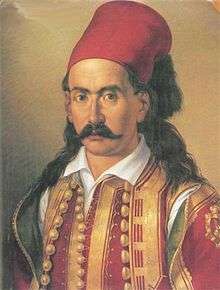 | |
| Born | c. 1788 Souli (Epirus), Ottoman Empire |
| Died | 21 August 1823 Karpenisi (Eurytania), Ottoman Empire |
| Buried | |
| Allegiance | |
| Rank | General of the Greek Army |
| Commands held | Commanding General of Western Central Greece |
| Battles/wars | Greek War of Independence: First Siege of Missolonghi Battle of Peta Battle of Karpenisi |
Early life
Botsaris was born into one of the leading clans of the Souliotes, in the region of Souli, Epirus.[3] He was the second son of captain Kitsos Botsaris, who was murdered in Arta in 1813 under the orders of Ali Pasha.[4] The Botsaris clan came from the village of Dragani (today Ambelia), near Paramythia.
French Army and repatriation to Souli
In 1803, after the capture of Souli by Ali Pasha, Botsaris and the remnants of the Souliotes crossed over to the Ionian Islands, where he served in the Albanian Regiment of the French army for 11 years and became one the regiment's officers.[5]
In 1815 he returned to Epirus.[6]In 1820, with other Souliots, he came back to Epirus and fought against Ali Pasha in the Ottoman army at the Siege of Ioannina, but soon the Souliotes changed side and fought the Ottoman army with the troops of Ali Pasha, in exchange of their former region, the Souli. In 1821, Christoforos Perraivos arrived at Epirus and informed the Souliotes about the existence Filiki Eteria and the upcoming revolution. [7]
Greek War of Independence
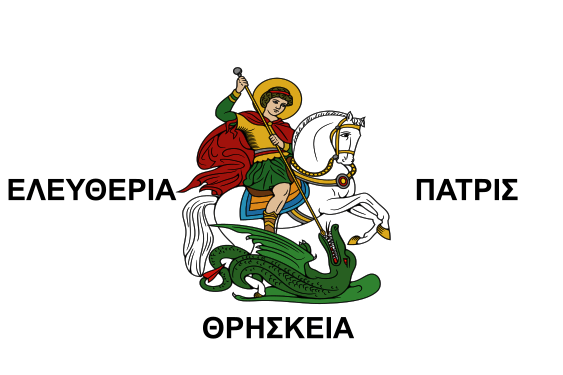
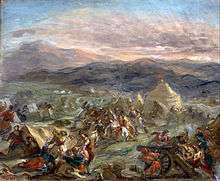
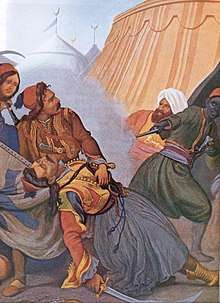
In 1821, Botsaris took part in the revolution against the Ottoman Empire. He and other Souliot captains, including Kitsos Tzavelas, Notis Botsaris, Lampros Veikos, and Giotis Danglis only enlisted fellow Souliot kin into their bands.[2] At the outbreak of the Greek War of Independence, he distinguished himself by his courage, tenacity and skill as a partisan leader in the fighting in western Greece, and was conspicuous in the defence of Missolonghi during the first siege of the city (1822–1823).
Recognizing his bravety and strategy, the Greek Govermment made him General of Western Greece. This act though angered the rest unranked Greek chieftains so Botsaris tear his millitary diploma apart in order to show them that he didn't care about ranks but only for the greater good of his country.[9]
On the night of 21 August 1823 he led the celebrated attack on Karpenisi by 350 Souliotes, against around 4,000 Albanian troops who formed the vanguard of the army with which Mustafa Pasha, the Pasha of Shkoder (modern northern Albania) and advanced to reinforce the besiegers.[10] Botsaris' men ambushed the enemy camp and inflicted serious casualties, but Botsaris was shot in the head and killed.[11]
Botsaris was buried with full honors in Missolonghi. After the Ottomans captured the city, in 1826, his grave was desecrated by Ottoman Albanian groups.[12]
Family and companions
Many of his family members became key figures of the Greek political establishment. Markos' brother Kostas (Constantine) Botsaris, who also fought at Karpenisi and completed the victory, lived on to become a respected Greek general and parliamentarian in the Greek kingdom.[13] He died in Athens on 13 November 1853. His daughter, Katerina "Rosa" Botsari, was in the service of Queen Amalia of Greece. Markos's son, Dimitrios Botsaris, born in 1813, was three times minister of war Kings Otto and George I.[14] He died in Athens on 17 August 1870.
Evangelis Zappas, the renowned benefactor and founder of the modern Olympic Games, was the aide-de-camp and close friend of Markos Botsaris.[15]
Legacy
Many Philhellenes visiting Greece had admired Botsaris' courage and numerous poets wrote poems about him. American poet Fitz-Greene Halleck wrote a poem entitled Marco Bozzaris, Juste Olivier also wrote an award-winning poem for him, in 1825.[16] The national poet of Greece, Dionysios Solomos, composed a poem titled "On Markos Botsaris", in which he likens the mourning over Botsaris' body to the lamentation of Hector, as described in the last book of the Iliad.[17] His memory is still celebrated in popular ballads in Greece.
Botsaris is also widely considered to be the author of a Greek–Albanian lexicon written in Corfu in 1809, at the insistence of François Pouqueville, Napoleon Bonaparte's general consul at the court of Ali Pasha in Ioannina.[18] The dictionary is of importance for the knowledge of the extinct Souliot dialect.[19] However, although the book is known as the Botsaris dictionary, scholar Xhevat Lloshi has argued in several works that Botsaris couldn't have possibly written that dictionary by himself, both because of his young age, and because of a note of Pouqueville that clearly says that the dictionary was drafted under the dictation of Marko's father, uncle, and future father-in-law.[20]
In Greek music, the Zakynthian composer Pavlos Carrer composed in 1858 the opera “Marco Bozzari” to his honour. In 1858 excerpts from the opera were performed in Athens in the presence of King Otto.[21] Also, there are several folk songs dedicated to Botsaris, like a Tsamiko from Central Greece, named Song of Markos Botsaris (Greek: του Μάρκου Μπότσαρη),[22] and from the Greek minority of southern Albania (Northern Epirus) (Καημένε Μάρκο Μπότσαρη).[23] Popular dramas and school plays were written soon after his death.[24][25]
Botsaris was depicted on the reverse of the Greek 50 lepta coin of 1976–2001.[26] He often adorns posters in Greek classrooms, government offices, and military barracks, as a member of the Greek pantheon of national heroes.
The Greek–Albanian dictionary
The original manuscript of the dictionary is at the National Library in Paris (Supplément Grec 251). Botsaris titled his dictionary “Lexicon of the simple Romaic and Arbanitic language” (Λεξικόν της Ρωμαϊκοις και Αρβανητηκής Απλής (sic)). The Greek terms are in columns on the left of the pages, not in alphabetical order, and the Albanian words on the right, written in Greek letters. Apart from single words, the dictionary includes complexes of words or short phrases. The Greek entries are in total 1701 and the Albanian 1494.
On the first page there is a hand-written notice by Pouqueville: “Ce lexique est écrit de la main de Marc Botzari à Corfou 1809 devant moi.” This manuscript, which includes also a kind of Greek–Albanian self-teaching method with dialogues written by Ioannes Vilaras and a French-Albanian glossary by Pouqueville, was donated by the latter to the Library in 1819. The dictionary was dictated to the young M. Botsaris by his father Kitsos (1754–1813), his uncle Notis (1759–1841) and his father-in-law Christakis Kalogerou from Preveza. Titos Yochalas, a Greek historian who studied and edited the manuscript, noticing that some Greek words are translated into Albanian in more than one way, believes that M. Botsaris was writing the Greek words and the elders were translating into Albanian. As many of the entries seem unlikely to be useful either for the Suliots or the Albanians of that time and circumstances, Yochalas believes that the dictionary was composed after Pouqueville's initiative, possibly as a source for a future French-Albanian dictionary. He also observes that the Albanian phrases are syntaxed as if were Greek, concluding that either the mother tongue of the authors was the Greek or the Greek language had a very strong influence on the Albanian, if the latter was possibly spoken in Souli (Yochalas, p. 53). The Albanian idiom of the dictionary belongs to the Tosk dialect of south Albanian and retains many archaic elements, found also in the dialect spoken by the Greco-Albanian communities of South Italy and Sicily. In the Albanian entries there are many loans from Greek (approx. 510), as well as from Turkish (approx. 190) and Italian (21).[27]
Gallery
 Tomb of Markos Botsaris in Missolonghi, copy by Georgios Bonanos. The original by French sculptor David d'Angers is in Athens.
Tomb of Markos Botsaris in Missolonghi, copy by Georgios Bonanos. The original by French sculptor David d'Angers is in Athens. Markos Botsaris by Giovanni Boggi, 1826.
Markos Botsaris by Giovanni Boggi, 1826.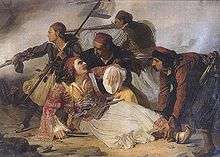 The death of Markos Botsaris. Painting by Ludovico Lipparini, Civico Museo Sartorio, Trieste, Italy.
The death of Markos Botsaris. Painting by Ludovico Lipparini, Civico Museo Sartorio, Trieste, Italy.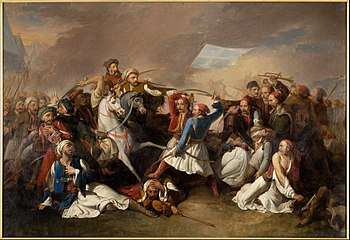 The death of Markos Botsaris. Painting by Marsigli Filippo, Benaki Museum, Athens.
The death of Markos Botsaris. Painting by Marsigli Filippo, Benaki Museum, Athens.- Bust in Pedion tou Areos
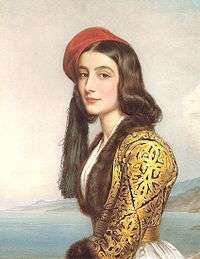 Katerina Rosa Botsaris (daughter of Markos) in Amalia dress. painted by Joseph Karl Stieler, Schönheitengalerie, Munich.
Katerina Rosa Botsaris (daughter of Markos) in Amalia dress. painted by Joseph Karl Stieler, Schönheitengalerie, Munich.
See also
References
- F. C. H. L. Pouquevile, "The History of the Greek Revolution, the Resurrection of Greece", volume IV, Athens 1890, page 239-248.
- Brigands with a Cause, Brigandage and Irredentism in Modern Greece 1821–1912, by John S. Koliopoulos, Clarendon Press, Oxford. 1987. p. 53. ISBN 0-19-822863-5
- Katherine Elizabeth Fleming. The Muslim Bonaparte: diplomacy and orientalism in Ali Pasha's Greece. Princeton University Press, 1999. ISBN 978-0-691-00194-4, p. 99"The Souliotes, a Greek-speaking tribe of Albanian origin... Ali had tried off and over..."
- Nikos Giannopoulos, Stratiotic History, part 138, 2008, page 11, Publications Periskopio
- Zamoyski, Adam (2000). Holy madness: romantics, patriots, and revolutionaries, 1776–1871. Viking. p. 232. ISBN 0-670-89271-8.
- Nikos Giannopoulos, "Markos Botsaris, the absolute exemplar of heroism", Miltary History, issue 138, 2008, page 11, Publications Periskopio
- Nikos Giannopoulos, "Markos Botsaris, the absolute exemplar of heroism", Military History, issue 138, 2008, page 12, Publications Periskopio
- Χατζηλύρας, Αλέξανδρος-Μιχαήλ. "H Ελληνική Σημαία. H ιστορία και οι παραλλαγές της κατά την Επανάσταση - Η σημασία και η καθιέρωσή της" (PDF). Hellenic Army General Stuff. p. 12. Retrieved 2 May 2016.
- Nikos Giannopoulos, "Markos Botsaris, the absolute exemplar of heroism", Military History, issue 138, 2008, page 16, Publications Periskopio
- Nikos Giannopoulos, "Markos Botsaris, the absolute exemplar of heroism", Military History, issue 138, 2008, page 17, Publications Periskopio
- Dakin, Douglas (1973). The Greek struggle for independence 1821–1833. Berkeley: University of California Press. p. 102. ISBN 9780520023420.
- Βαρβαρήγος, Ποθητός. Θρησκεία και Θρησκευτική Ζωή κατά τον πόλεμο της Ανεξαρτησίας (in Greek). University of Thessaloniki. pp. 73, 98. Retrieved 17 February 2013.
- University of Chicago (1946). Encyclopædia britannica: a new survey of universal knowledge, Volume 3. Encyclopædia britannica, inc. p. 957.
Marco Botsaris’s brother Kosta (Constantine), who fought at Karpenisi and completed the victory, lived to become a general and senator in the Greek Kingdom. Kosta died in 1853..
- University of Chicago. Encyclopædia britannica: a new survey of universal knowledge. Encyclopædia britannica, inc., 1946, p. 957
- The Modern Olympics, A Struggle for Revival, by David C. Young. p. 13. 1996 The Johns Hopkins University Press. ISBN 0-8018-5374-5
- Poetry Archive - Marco Bozzaris
- Mackridge, edited by Peter (1996). Ancient Greek myth in modern Greek poetry : essays in memory of C.A. Trypanis (1. publ. ed.). London: Frank Cass. pp. xvii. ISBN 978-0-7146-4751-7.CS1 maint: extra text: authors list (link)
- Markos Botsarēs, Titos P. Giochalas: To Hellēno-Alvanikon lexikon tou Markou Botsarē: (philologikē ekdosis ek tou autographou), Grapheion Dēmosieumatōn tēs Akadēmias Athēnōn, 1980, 424 pages.
- JOCHALAS, Titos, To ellino-alvanikon lexikon tou Markou Botzari, Athens 1980.
- Lloshi, Xhevat (2008). Rreth Alfabetit te shqipes. Logos. p. 107. ISBN 9989582688. Retrieved 1 June 2010.
- A. Xepapadakou, “The Marco Bozzari by Pavlos Carrer, a ‘national’ Opera”, in Moussikos Logos, 5, Corfu: Ionian University-Dept. of Music Studies, 2003, 27–63.
- Antōnēs I. Phlountzēs Akronauplia kai Akronaupliōtes, 1937–1943. Themelio, 1979, p. 286 (Greek)
- Nikolaos V. Dēmētriou,Eleutherios N. Dēmētriou. Voreios Ēpeiros: tragoudia kai choroi. Trochalia, 2000, p. 45.
- Enangelides Tryfon, The education during the Turkish occupation, Athens, 1936, vol. 2, p. 79. A school play titled "Markos Botsaris" was played in Greece in 1825.
- Alkaios Theodoros, The death of Markos Botsaris, published in Athens, undated. The author died in 1833.
- Bank of Greece Archived 28 March 2009 at the Wayback Machine. Drachma Banknotes & Coins: 50 lepta Archived 1 January 2009 at the Wayback Machine. – Retrieved on 27 March 2009.
- Yochalas Titos (editor, 1980) The Greek-Albanian Dictionary of Markos Botsaris. Academy of Greece, Athens 1980 (in Greek)
Sources

- Botsaris, 180 Years from the Greek Revolution
- Lloshi, Xhevat (2008). Rreth Alfabetit te Shqipes. Logos. ISBN 9789989582684.
External links
